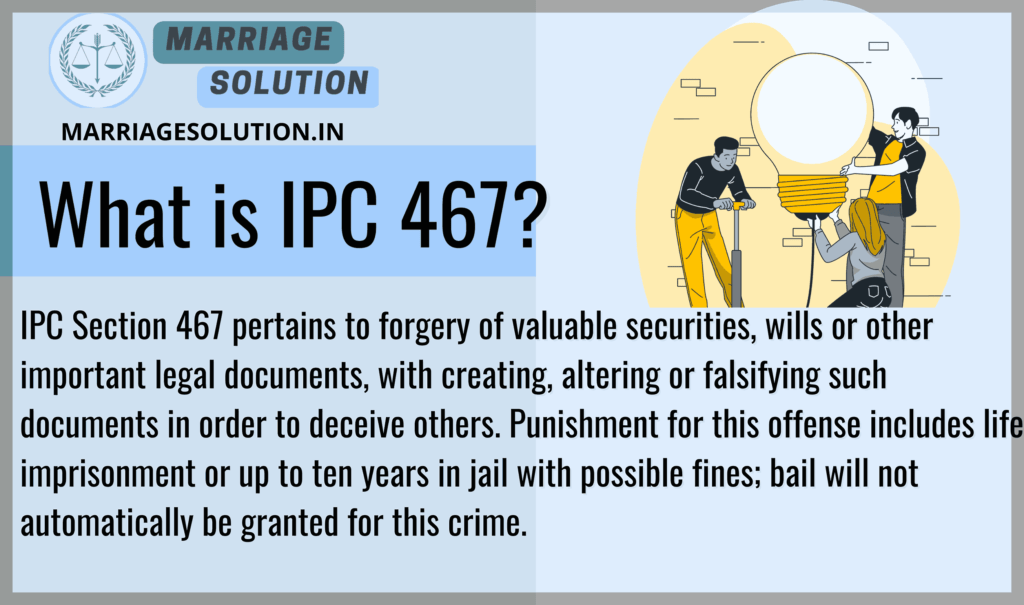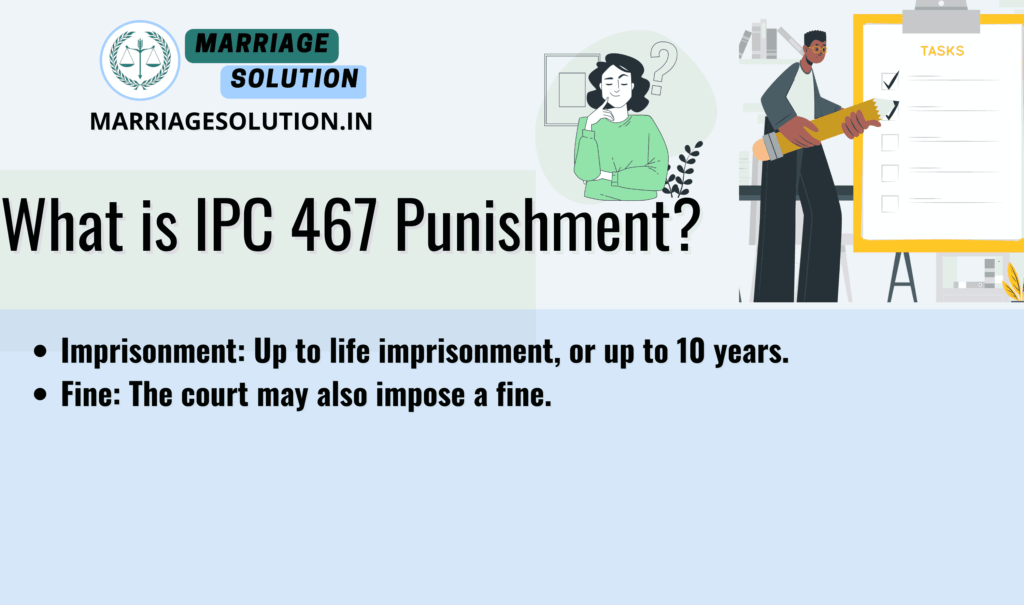Introduction of IPC 467
IPC 467 is an essential part within the Indian Penal Code that addresses fraud in the creation of important wills, securities as well as other significant legal documents. The law prohibits the creation or alteration of these documents in the intention of be deceiving. Criminal offenses that are in violation of IPC 467 are regarded as serious and can result in severe penalties that include prison for life or up to 10 years, as well as fines. Knowing IPC 467 is crucial to keeping trust and honesty when it comes to financial and legal transactions.

What is IPC Section 467 ?
IPC Section 467 pertains to forgery of valuable securities, wills or other important legal documents, with creating, altering or falsifying such documents in order to deceive others. Punishment for this offense includes life imprisonment or up to ten years in jail with possible fines; bail will not automatically be granted for this crime.
Section 467 IPC Overview
IPC 467 delineates the offense of forgery concerning valuable securities, wills, and other significant documents. Forgery, as defined by this section, encompasses various acts such as creating, altering, or falsifying documents with the deliberate intention to deceive. The repercussions of such actions can be severe, posing a threat to the authenticity and credibility of essential legal and financial instruments.
Key Points of IPC 467:
- Definition of Forgery:
- IPC 467 encapsulates a broad spectrum of fraudulent activities, including the creation of counterfeit documents or the alteration of existing ones, all with the nefarious intent to mislead or defraud others.
- Types of Documents Covered:
- This section extends its jurisdiction over a wide array of documents, ranging from valuable securities like stocks and bonds to crucial legal documents such as wills, where the ramifications of forgery could have far-reaching consequences.
- Intent to Deceive:
- Central to the notion of forgery under IPC 467 is the presence of a deliberate intent to deceive. Perpetrators engage in these deceptive practices with the sole purpose of manipulating others for personal gain or advantage.
- Severe Penalties:
- Recognizing the gravity of the offense, IPC 467 imposes stringent penalties on individuals found guilty of forgery. These penalties may include imprisonment and fines, serving as a deterrent against engaging in such fraudulent activities.
- Non-Bailable Offense:
- The classification of forgery under IPC 467 as a non-bailable offense underscores the severity of the crime. Bail is not granted as a matter of right, with the decision left to the discretion of the court, considering the specifics of each case.
- Protecting Integrity:
- IPC 467 assumes a pivotal role in safeguarding the integrity of essential legal and financial documents. By deterring fraudulent activities and ensuring the sanctity of these documents, this section upholds the trust and reliability essential for the functioning of legal and financial systems.
467 IPC Punishment
- Imprisonment: Up to life imprisonment, or up to 10 years.
- Fine: The court may also impose a fine.

467 IPC bailable or non bailable ?
IPC 467 is a non-bailable offense, meaning bail will not automatically be granted to those accused of forgery involving valuable documents. Instead, bail applications must be filed with the court, who will make their decision based on factors like severity of crime, evidence and potential flight risk – this reflects its serious nature.
467 of IPC in short information
| Aspect | Details |
|---|---|
| Offense | Forgery of valuable security, wills, or other important legal documents. |
| Definition | Creating, altering, or falsifying valuable documents with the intent to deceive. |
| Punishment | Imprisonment for life or up to 10 years, and a possible fine. |
| Bailable | Non-bailable. The accused must apply for bail, and the court decides based on the case details. |
467 IPC FAQs
What is IPC 467?
IPC 467 is a section of the Indian Penal Code that criminalizes the act of forgery involving valuable securities, wills, or any authority to make or transfer valuable securities. It is considered a serious offense under the law.
Is IPC 467 Bailable or Non-Bailable?
The offense under IPC 467 is a non-bailable offense, which means that the accused cannot claim bail as a matter of right. The decision to grant bail rests with the court’s discretion based on the circumstances of the case.
Can a person be convicted under IPC 467 without the intention to defraud?
No, the intention to defraud or cause wrongful loss is a crucial element of the offense under IPC 467. Mere forgery without such intent may not constitute an offense under this section.
Can a company or corporation be held liable under IPC 467?
Yes, if the offense is committed by individuals acting on behalf of a company or corporation, the company or corporation can be held vicariously liable under certain circumstances.
What is the statute of limitations for offenses under IPC 467?
There is no specific statute of limitations mentioned in the IPC for offenses under Section 467. However, the general principles of limitation apply, and the prosecution should be initiated within a reasonable time frame.
If you need support with court proceedings or any other legal matters, don’t hesitate to reach out for assistance.
Court or any other marriage-related issues, our https://marriagesolution.in/lawyer-help-1/ website may prove helpful. By completing our enquiry form and submitting it online, we can provide customized guidance to navigate through the process effectively. Don’t hesitate to contact us for personalized solutions; we are here to assist you whenever necessary!
